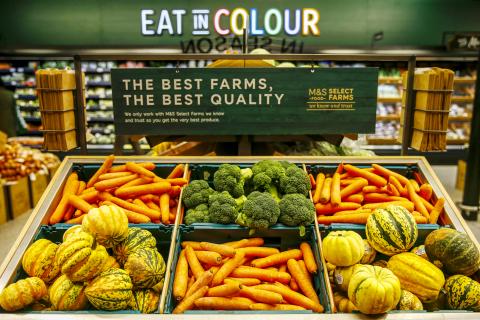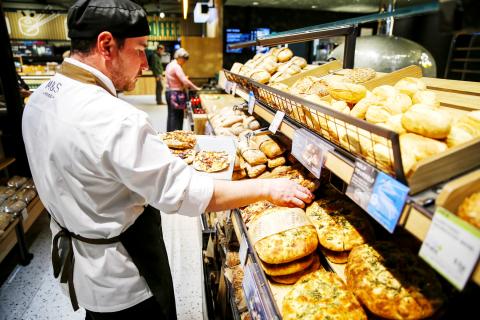Mobile phone apps that point shoppers to discounted groceries, codes on chicken and cheese that display their origin and water dispensers and degradable packaging that slash plastic use.
These are just some of the steps European supermarkets are taking to attract customers increasingly concerned about the environmental cost of farming, food waste and everyday products.
“We are witnessing a bit of a seismic change in attitudes in consumers who are purchasing food,” said Julian Burnett, vice president for the distribution sector at IBM UK & Ireland.

Photo: Bloomberg
“There’s more awareness than ever before about the provenance of food and sustainable practices,” he added.
Tech giant IBM recently conducted an online survey of 6,000 consumers in Britain, Spain and Italy, which showed a majority in the two southern European countries would be willing to pay more and shop at places that support a greener food system.
The exercise was prompted by the growing demand faced by IBM’s retail clients to produce food sustainably — concerns that are likely to increase in the future, said Burnett.

Photo: Bloomberg
“We have the same feeling,” said Fausto Iori, CEO of NaturaSi, an Italian organic supermarket chain with about 500 stores countrywide, noting customers have responded positively to the company’s efforts to cut waste.
Three months ago, NaturaSi started putting products nearing their expiry date on Too Good To Go, an app available in 15 countries.
“We sold 10,000 boxes (equivalent to 10 tonnes) of food through the app,” he said.
NaturaSi was also the first Italian supermarket to install water dispensers — blue, vending machine-like boxes with a touch screen — to shift customers away from plastic bottles, he said.
Italians consume 206 liters of bottled water per year, the second highest in the world after Mexico, according to Italian environmental non-profit Legambiente.
But NaturaSi’s customers are keen to kick the habit, Iori said.
French retailing giant Carrefour SA, meanwhile, is deploying blockchain technology to compile detailed information on 24 products, including chicken, cheese, milk and oranges, in five countries, said project manager Emmanuel Delerm.
Customers can scan a QR code on a packet of chicken with their phones and find out when the bird was born, who the farmer is, if it was raised using antibiotics, when it was slaughtered and processed, and when it arrived at the store, he said.
“In all the countries where we are operating, there is an interest in transparency and traceability — not only the provenance but the conditions in which the products have been produced and harvested,” Delerm explained.
The company, which worked on its blockchain platform with IBM, said sales of those products had increased.
In neighboring Spain, popular supermarket chain Mercadona is teaming up with an incubator to find and fund start-ups to help it eliminate plastics, reduce waste and save energy.
PRE-PAID FARMING?
Daniel Vennard, director of the London-based Better Buying Lab, which encourages more sustainable eating, said retailers were no longer competing only on price, quality and convenience.
“That’s still very important but now I think [they] are increasingly looking to differentiate their offer and almost think of themselves as lifestyle brands, embodying the values of the consumers they want to attract,” he said.
He pointed to a 2018 Christmas advert from British frozen-food chain Iceland about an orangutan whose habitat was destroyed by deforestation linked to palm oil production.
It triggered a public conversation about the issue, after it was banned by regulators, enabling the firm to reposition itself as more than a place for affordable food, Vennard said.
Better Buying Lab, set up by the World Resources Institute, works with Sainsbury’s, Britain’s second-biggest supermarket group, and French food services group Sodexo, among others.
Last month Sainsbury’s pledged to cut its greenhouse gas emissions to net zero by 2040, a decade ahead of the British government’s own target.
NaturaSi’s Iori, meanwhile, is mulling how to use blockchain for a new “pre-paid farming” model that would allow loyal customers to support farmers along the value chain by buying green products six months to a year before they receive them.
“This is the next step ... under the sustainability revolution,” he said.
CLIMATE VS COST
Agriculture, forestry and other land uses together account for nearly a quarter of the greenhouse gas emissions heating up the planet, according to the UN climate science panel.
Throwing away food also releases climate-warming methane when left to rot in landfill.
Intensive farming, meanwhile, is a major cause of accelerating soil erosion, as it strips away the highly fertile top layer, which could threaten global food production, experts have warned.
IBM’s survey suggests consumers are concerned about issues like these — and many, particularly in Spain and Italy, plan to vote with their wallet, it revealed.
Three-quarters of respondents in those two countries said they were willing to pay extra for food grown using practices that do not degrade the soil.
More than half also said they would spend at least 5 percent more than average for groceries from a sustainable source and would shop at supermarkets that are working to cut food waste.
British consumers expressed similar sentiments but in fewer numbers, with just over half saying high prices stopped them eating more responsibly sourced food.
“The challenge in the UK is producing better products for near enough the same price,” said Andrew Opie, director of food and sustainability at the British Retail Consortium, whose members include all major supermarkets.
The top issue they have faced for the last 18 months has “undoubtedly” been plastics and packaging, with constant enquiries from consumers and green groups, he noted.
Now the body is starting to see a similar pattern with public concern over climate change.
“The protests here ... have definitely put it much higher on the agenda for supermarkets,” Opie said.

May 11 to May 18 The original Taichung Railway Station was long thought to have been completely razed. Opening on May 15, 1905, the one-story wooden structure soon outgrew its purpose and was replaced in 1917 by a grandiose, Western-style station. During construction on the third-generation station in 2017, workers discovered the service pit for the original station’s locomotive depot. A year later, a small wooden building on site was determined by historians to be the first stationmaster’s office, built around 1908. With these findings, the Taichung Railway Station Cultural Park now boasts that it has

The latest Formosa poll released at the end of last month shows confidence in President William Lai (賴清德) plunged 8.1 percent, while satisfaction with the Lai administration fared worse with a drop of 8.5 percent. Those lacking confidence in Lai jumped by 6 percent and dissatisfaction in his administration spiked up 6.7 percent. Confidence in Lai is still strong at 48.6 percent, compared to 43 percent lacking confidence — but this is his worst result overall since he took office. For the first time, dissatisfaction with his administration surpassed satisfaction, 47.3 to 47.1 percent. Though statistically a tie, for most

Six weeks before I embarked on a research mission in Kyoto, I was sitting alone at a bar counter in Melbourne. Next to me, a woman was bragging loudly to a friend: She, too, was heading to Kyoto, I quickly discerned. Except her trip was in four months. And she’d just pulled an all-nighter booking restaurant reservations. As I snooped on the conversation, I broke out in a sweat, panicking because I’d yet to secure a single table. Then I remembered: Eating well in Japan is absolutely not something to lose sleep over. It’s true that the best-known institutions book up faster

In February of this year the Taipei Times reported on the visit of Lienchiang County Commissioner Wang Chung-ming (王忠銘) of the Chinese Nationalist Party (KMT) and a delegation to a lantern festival in Fuzhou’s Mawei District in Fujian Province. “Today, Mawei and Matsu jointly marked the lantern festival,” Wang was quoted as saying, adding that both sides “being of one people,” is a cause for joy. Wang was passing around a common claim of officials of the People’s Republic of China (PRC) and the PRC’s allies and supporters in Taiwan — KMT and the Taiwan People’s Party — and elsewhere: Taiwan and